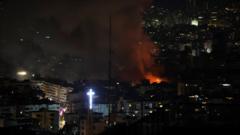Israel has conducted airstrikes in southern Beirut, claiming to target Hezbollah's drone production facilities, amid heightened tensions and a ceasefire agreement. The attacks have triggered evacuation warnings and widespread condemnation from Lebanese officials, marking a significant escalation in the region just before a major Islamic holiday.
Israeli Airstrikes Target Hezbollah in Southern Beirut Ahead of Eid Al Adha

Israeli Airstrikes Target Hezbollah in Southern Beirut Ahead of Eid Al Adha
The ongoing conflict between Israel and Hezbollah escalates with targeted strikes in Beirut, raising international concerns and condemnation.
Israel has launched multiple airstrikes on southern Beirut, purportedly aiming at a Hezbollah unit involved in drone production. The strikes occurred on Thursday evening, just before the Eid Al Adha holiday, and followed urgent evacuation warnings for various buildings within the densely populated area known for its Hezbollah operations. The Israeli Defence Forces (IDF) asserted that the targeted Hezbollah unit had been responsible for the underground production of "thousands" of drones, allegedly funded by Iranian sources.
Lebanon's Prime Minister, Nawaf Salam, expressed strong condemnation of the Israeli attacks, labeling them as systematic and deliberate assaults on Lebanon's sovereignty, particularly poignant given the timing of the strikes coinciding with an Islamic celebration. Thousands of residents evacuated the streets, exacerbating traffic congestion, while plumes of smoke were seen in the sky following the bombardments. Lebanese President Joseph Aoun condemned the strikes as a "blatant violation of international accords," further emphasizing the provocation of such attacks during a sacred religious festival.
The IDF stated that Hezbollah's extensive use of drones was essential to its operational capacity against Israel, characterizing the strike as a response to ongoing threats that violate previous agreements between Israel and Lebanon. Notably, these strikes occurred despite a ceasefire that had held for six months, following a period of intense violence that resulted in significant casualties and displacement in Lebanon.
Just an hour prior to the airstrikes, an official Israeli military spokesperson instructed residents in the Hadath, Haret Hreik, and Borj el-Barajneh neighborhoods to evacuate, citing risks from Hezbollah infrastructure present in their vicinity. In the lead-up to the recent tensions, prior to the Israel-Gaza conflict escalation in October, Israel and Hezbollah had already engaged in more than a year of altercations, leading to substantial Israeli military operations aimed at dismantling Hezbollah assets along the border.
Following that escalation, a ceasefire was established in late November between Israel and Lebanon, in which the Israeli military withdrew and Lebanese forces took over southern Lebanon's policing. Still, recent Israeli strikes continue to challenge the truce, with the Lebanese government asserting that such military actions violate the terms of the ceasefire.
As Hezbollah solidifies its ties with Palestinian groups, the backdrop of this involved conflict amplifies tensions in the region, as the latest airstrikes draw international scrutiny and highlight the fragile nature of peace agreements in the highly volatile Middle East.






















